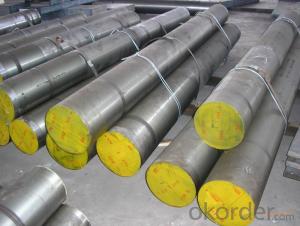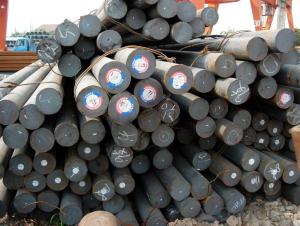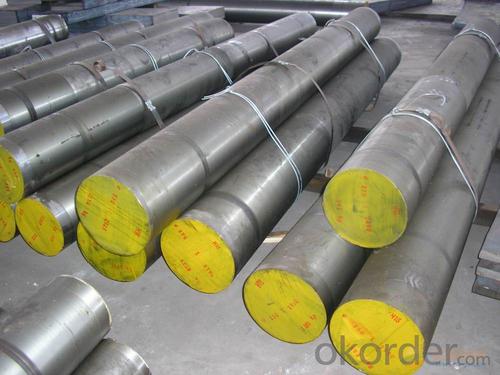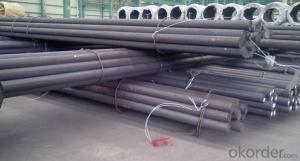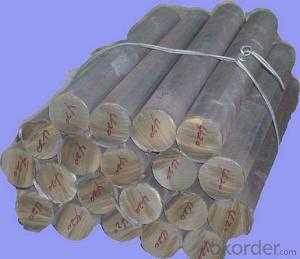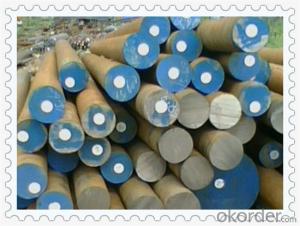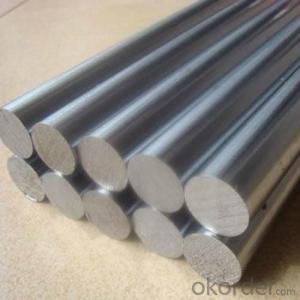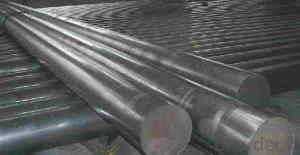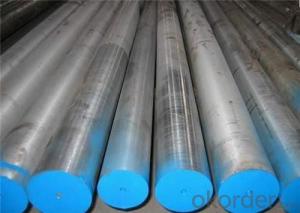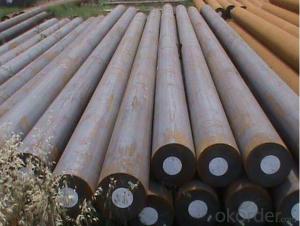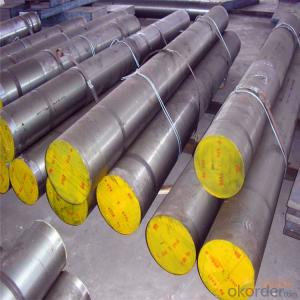SAE 52100 Bearing Steel Round Bars
- Loading Port:
- Tianjin
- Payment Terms:
- TT OR LC
- Min Order Qty:
- 25 m.t.
- Supply Capability:
- 50000 m.t./month
OKorder Service Pledge
OKorder Financial Service
You Might Also Like
Specification
SAE 52100 Bearing Steel Round Bars
Product description:
Material | suj2 | ||
Chemical Composition | Mechanical Properties(In Quenched & Tempered State) | ||
C | 0.95-1.05 | Tensile strength(MPA) | ---- |
Si | 0.15-0.35 | Yield strength (MPA) | -- |
Mn | 0.25-0.45 | Elongation(δ5/%) | -- |
Cr | 1.40-1.65 | Reduction in Area (ψ/%) | -- |
Mo | ≤0.10 | Impact (J) | -- |
P | ≤0.025 |
Hardness | HB170-207 HB207-229 HB270-390 HB229-285 HRC62-66 HRC61-66 HRC≈67 |
S | ≤0.025 | ||
Ni | ≤0.30 | ||
Cu | ≤0.25 | ||
Ni+Cu | ≤0.50 | ||
Charactteristics:
Flat Steel GCr15 Flats are of
Good hardening ability. Good wear resistance. Shadow depth of hardness
Harden from a temperature of 790-820oC, 820-860oC followed by water or oil quenching. Hardness after quenching is 63-67, 63-66 HRC.
Tempering temperature: 150-300oC. Hardness after tempering is 56-65 HRC.
Application:
Commom steel used to produce balls and rings of bearing. The product has characteristics of uniform-chemical composition, low percentage of harmful elements, high purity, well-distributed carbide, good surface quality. It also has characteristics of wide scope of plastic,stable heat-treatment quality, uniformand high hardness, high wear resistance,high strength of touching fatigue. It has excellent machining property afer spheroidize annealing.
The use of products The product is used to produce balls and rings of bearing. Future Development By rational rolling and cooling process, the product can be spheroidized on-line and can be used in drawing and machining directly by customers. By combining re-spheroidize annealing and re-crystallisation of semi-finished product, the steel wire process can be simplified.
Product show:
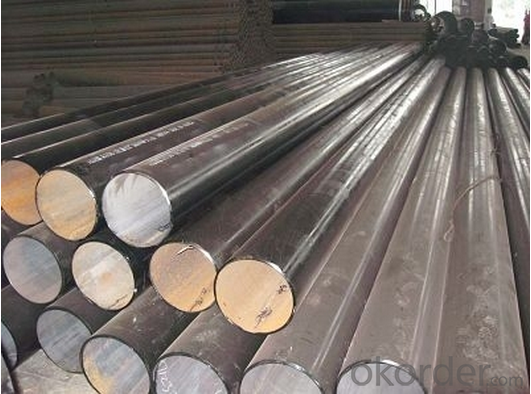
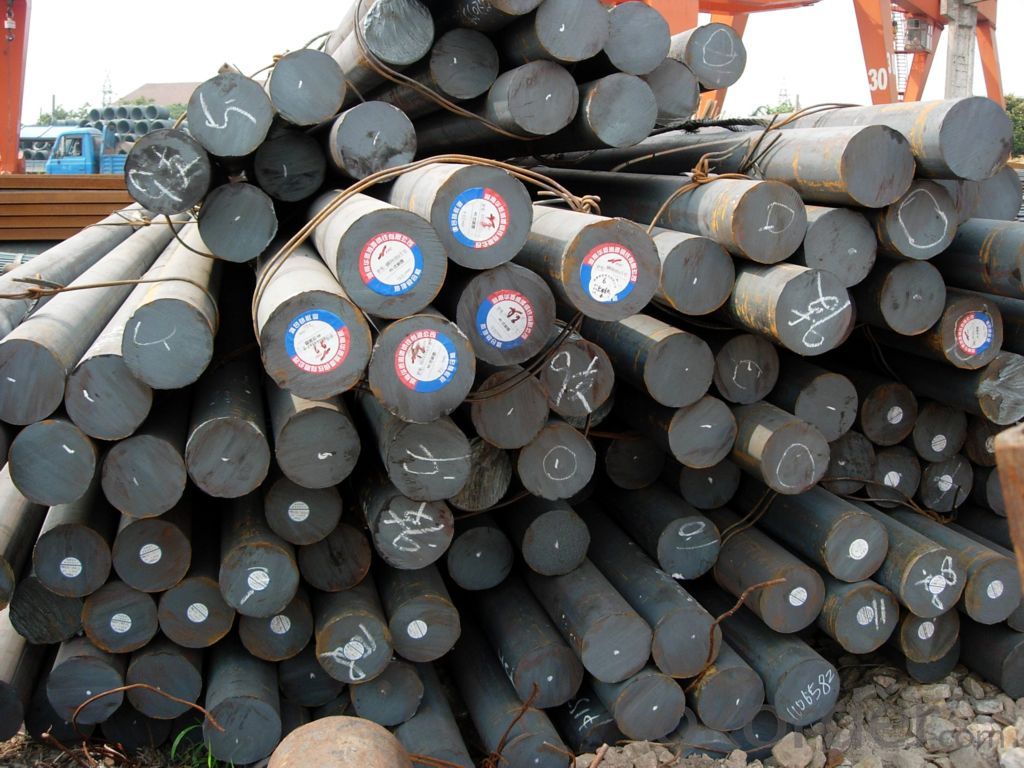
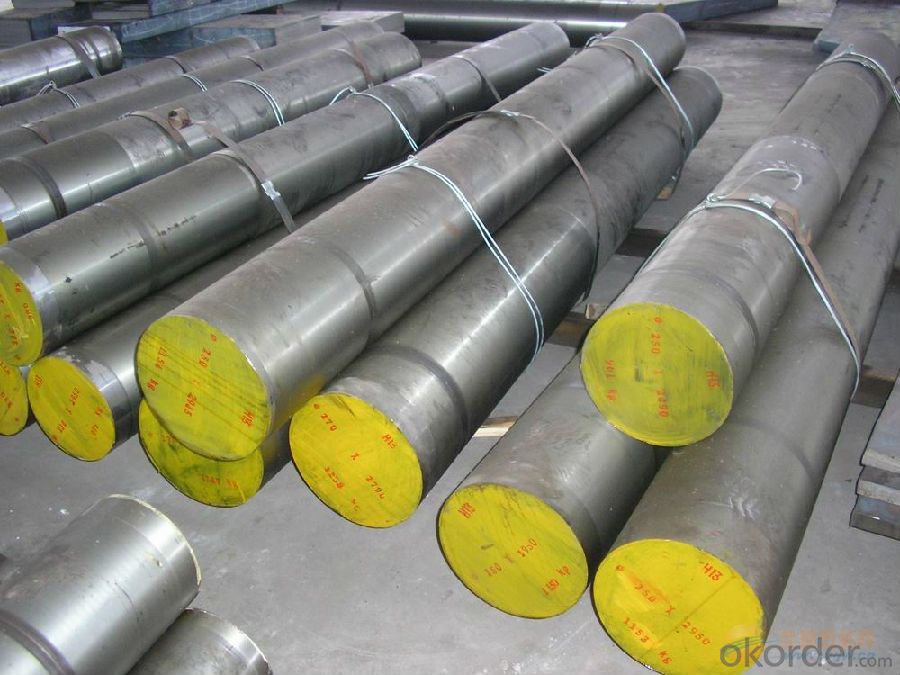
- Q: How does special steel contribute to the durability of products?
- There are several ways in which special steel enhances the durability of products. Initially, special steel's notable qualities of high strength and hardness make it resistant to wear and tear. As a result, products constructed from special steel can endure heavy usage and outlast those made from regular steel or alternative materials. Moreover, special steel commonly incorporates other elements like chromium, nickel, and molybdenum, which heighten its resistance to corrosion. This is particularly crucial for products exposed to harsh environments or chemicals. The corrosion resistance of special steel aids in preventing rust and deterioration, thus increasing the product's lifespan. Additionally, special steel can undergo heat treatment to enhance its mechanical properties, including toughness and hardness. Through specific heating and cooling processes, heat-treated special steel becomes stronger, rendering it less susceptible to deformation and breakage. This is especially advantageous for products subjected to heavy loads or impacts. Furthermore, special steel is often manufactured with precise composition and microstructure, resulting in improved material properties. This encompasses superior fatigue resistance, implying that the material can endure repeated stress without developing cracks or breaking. Consequently, products made from special steel exhibit enhanced reliability and are less prone to failure. In conclusion, special steel significantly contributes to product durability through its high strength, corrosion resistance, improved mechanical properties, and superior fatigue resistance. By incorporating special steel into the manufacturing process, products can be designed to withstand various demanding conditions, ensuring a longer lifespan and greater reliability.
- Q: How is special steel used in the packaging supply chain?
- Special steel is used in the packaging supply chain for various purposes. It is used to manufacture durable and strong packaging equipment such as steel drums, containers, and pallets. These steel products ensure the safe transportation and storage of goods, especially heavy or hazardous materials. Additionally, special steel is used in the production of cutting tools, blades, and molds that are essential for packaging processes. Overall, special steel plays a crucial role in ensuring the efficiency, reliability, and safety of the packaging supply chain.
- Q: What are the properties of wear-resistant steel?
- Wear-resistant steel possesses several properties that make it suitable for withstanding wear and abrasion. These properties include high hardness, toughness, and strength, which help in resisting deformation, chipping, and cracking. Additionally, wear-resistant steel also exhibits excellent corrosion resistance, enabling it to withstand exposure to harsh environments without deteriorating. These properties make wear-resistant steel a popular choice for applications that involve heavy machinery, mining equipment, cutting tools, and industrial components subjected to constant wear and tear.
- Q: What are the different heat treatment furnaces used for special steel?
- Special steel is commonly subjected to various heat treatment processes using different types of furnaces. Each furnace serves a specific purpose and is engineered to create the ideal heating and cooling conditions necessary for the steel to attain its desired properties. One of the furnaces employed for special steel is the annealing furnace. This furnace utilizes a technique called annealing, which entails heating the steel to a specific temperature and then gradually cooling it to enhance its softness and ductility. To prevent oxidation during the process, annealing furnaces are often equipped with controlled atmospheres. Another type of furnace utilized for special steel is the quenching furnace. Quenching is a process that involves rapidly cooling the steel to increase its hardness. Quenching furnaces are designed to provide the required cooling rate and may utilize specialized cooling mediums like oil or water to achieve the desired outcome. Tempering furnaces are also commonly employed for special steel. Tempering involves heating the steel to a specific temperature and subsequently cooling it to enhance its toughness and reduce brittleness. These furnaces enable precise temperature control throughout the tempering process. Furthermore, carburizing furnaces are utilized for special steel. Carburizing is the process of introducing carbon into the surface of the steel to enhance its hardness. Carburizing furnaces are equipped with controlled atmospheres and designed to provide the necessary temperatures and carbon-rich environments for the carburizing process. In summary, the various heat treatment furnaces used for special steel serve distinct purposes such as annealing, quenching, tempering, or carburizing. These furnaces are meticulously engineered to provide the requisite heating and cooling conditions for the steel to achieve its desired properties.
- Q: What are the requirements for special steel used in cryogenic applications?
- To ensure optimal performance and reliability in extremely low-temperature environments, special steel employed in cryogenic applications must fulfill a range of prerequisites. First and foremost, the steel must exhibit exceptional low-temperature toughness, enabling it to endure the extreme cold without succumbing to brittle fracture or compromising its mechanical properties. It is imperative that the steel possesses high toughness and ductility to effectively absorb impacts and prevent cracking. Moreover, the steel must possess a low coefficient of thermal expansion. This characteristic assumes significance as cryogenic applications involve substantial temperature fluctuations. A high coefficient of thermal expansion can result in dimensional instability and stress within the material. Conversely, a low coefficient of thermal expansion mitigates these effects and maintains dimensional stability. Furthermore, the steel should demonstrate low thermal conductivity. Given that cryogenic applications often entail the transfer or storage of substances at extremely low temperatures, minimizing heat transfer is essential. A low thermal conductivity aids in maintaining the desired temperature and prevents unwanted heat exchange. This aspect is particularly critical in applications where precise temperature control is paramount, such as the storage of liquefied gases. In addition, the steel must exhibit excellent corrosion resistance. Cryogenic environments can be highly corrosive, necessitating the steel's ability to withstand the detrimental effects of corrosive substances that may be present. This attribute is particularly vital in applications involving the storage or transportation of cryogenic liquids or gases. Finally, the steel should possess good weldability. Welding is often necessary to join different components or sections of the steel in cryogenic applications. Therefore, ensuring the steel's weldability is crucial to establish strong and reliable joints. In summary, the requirements for special steel used in cryogenic applications encompass exceptional low-temperature toughness, a low coefficient of thermal expansion, low thermal conductivity, excellent corrosion resistance, and good weldability. Satisfying these requirements guarantees the steel's ability to withstand the harsh conditions and extreme cold of cryogenic environments while preserving its structural integrity and performance.
- Q: How does special steel contribute to the electronics aftermarket industry?
- Special steel plays a crucial role in the electronics aftermarket industry by providing high-performance materials that are essential for the manufacturing of various electronic components. It contributes to the industry in several ways: 1. Durability and reliability: Special steel alloys offer exceptional strength, hardness, and resistance to wear and corrosion, making them perfect for producing electronic parts that need to withstand harsh operating conditions. This ensures the longevity and reliability of electronic devices, which is a key requirement for the aftermarket industry. 2. Heat dissipation: Many electronic devices generate significant heat during operation, which can affect their performance and lifespan. Special steel alloys with excellent thermal conductivity properties enable efficient heat dissipation, preventing overheating and improving the overall performance of electronic components. 3. Precision manufacturing: Special steel alloys, such as stainless steel, can be machined with high precision, allowing for the production of intricate and complex electronic parts. This is particularly important for the aftermarket industry, as it often involves the replacement or repair of specific components in electronic devices. 4. Electromagnetic shielding: Special steel alloys can be utilized to create electromagnetic shielding, which is crucial in preventing interference and maintaining the integrity of electronic signals. This is especially important for sensitive electronic equipment that may be affected by external electromagnetic fields. 5. Customization and adaptability: Special steel can be customized to meet the specific requirements of electronic devices, allowing for the production of tailor-made components. This versatility enables manufacturers in the electronics aftermarket industry to develop and offer a wide range of specialized products that cater to various consumer needs and preferences. Overall, special steel contributes significantly to the electronics aftermarket industry by providing durable, reliable, and high-performance materials that are essential for the manufacturing of electronic components. Its unique properties enable the production of long-lasting and efficient devices, while also allowing for customization and adaptability to meet the ever-evolving demands of the market.
- Q: What are the different methods of heat treatment for special steel?
- There are several different methods of heat treatment for special steel, each designed to enhance specific properties of the steel. These methods include: 1. Annealing: This method involves heating the steel to a specific temperature and then slowly cooling it, typically in a controlled atmosphere. Annealing helps to relieve internal stresses, improve machinability, and soften the steel for further processing. 2. Normalizing: Normalizing is a heat treatment process that involves heating the steel to a temperature above its critical temperature and then air cooling it in still air. This method is commonly used to refine the grain structure of the steel, improve its mechanical properties, and enhance its strength and toughness. 3. Quenching: Quenching is a method that involves rapidly cooling the steel from a high temperature by immersing it in a quenching medium such as oil, water, or brine. This process results in the formation of a very hard and brittle structure known as martensite, which increases the steel's hardness and wear resistance. 4. Tempering: Tempering is performed after quenching and involves reheating the steel to a specific temperature and holding it there for a certain period of time, followed by air cooling. This process helps to reduce the brittleness of the steel caused by quenching and improves its toughness, ductility, and impact resistance. 5. Austempering: Austempering is a heat treatment method that involves quenching the steel from a high temperature and then holding it at a specific temperature for a prolonged period of time. This process produces a structure called bainite, which provides a combination of strength, toughness, and ductility. 6. Martempering: Martempering is a variation of quenching that involves cooling the steel to a temperature just above its martensitic transformation range and then holding it at that temperature until it becomes uniformly cooled. This method reduces the risk of distortion and cracking compared to traditional quenching and provides improved toughness and dimensional stability. 7. Induction hardening: Induction hardening is a surface heat treatment method used to selectively harden specific areas of the steel. It involves heating the surface of the steel using induction heating and then rapidly quenching it. This process results in a hardened surface layer while maintaining the toughness and ductility of the core. These different methods of heat treatment for special steel provide a range of options to optimize the desired properties of the steel, depending on the specific application and requirements.
- Q: What are the mechanical properties of special steel?
- Enhanced mechanical properties are possessed by special steels, also known as alloy steels, in comparison to regular carbon steels. These properties differ based on the concentration and specific alloying elements. Some common mechanical properties of special steel are as follows: 1. High tensile strength: Special steels are recognized for their exceptional strength, making them suitable for applications requiring high load-bearing capacity. The tensile strength of these steels can vary from 500 MPa to over 2,000 MPa, depending on the composition. 2. Improved hardness: The inclusion of alloying elements in special steels can significantly increase their hardness. This property is desirable for applications that demand resistance to wear and abrasion. Special steels can achieve hardness levels ranging from 200-600 HB (Brinell hardness), depending on the specific alloy composition and heat treatment. 3. Good toughness: Special steels commonly exhibit good toughness, which refers to their ability to absorb energy before fracturing. This property is crucial for components subjected to impact or dynamic loading. The combination of high strength and toughness makes special steels suitable for demanding applications such as automotive parts or industrial machinery. 4. Excellent fatigue resistance: Special steels are engineered to withstand cyclic loading without failure. They display enhanced fatigue resistance, enabling them to endure repeated stress cycles without compromising their structural integrity. This property makes special steels ideal for critical components in the aerospace, automotive, and machinery industries. 5. Superior corrosion resistance: Depending on the alloy composition, special steels can offer improved corrosion resistance compared to regular carbon steels. The addition of elements like chromium, nickel, or molybdenum aids in the formation of protective oxide layers on the surface, preventing corrosion and increasing durability. 6. High temperature resistance: Certain special steels are specifically formulated to perform well at elevated temperatures. They possess excellent heat resistance and can retain their mechanical properties even under extreme temperatures. This property is crucial for applications such as turbine blades, exhaust systems, or high-temperature furnaces. It is important to note that the specific mechanical properties of special steel can vary significantly depending on the specific alloy composition, heat treatment, and processing techniques employed. Therefore, it is essential to consult the material specifications or seek expert advice to determine the exact mechanical properties of a particular special steel.
- Q: How does special steel contribute to the efficiency of industrial equipment?
- Several factors contribute to the efficiency of industrial equipment, with special steel playing a crucial role. Firstly, the use of special steel alloys offers superior strength and hardness properties compared to regular steel. This enables the construction of more durable and robust equipment, reducing the frequency of repairs or replacements. Consequently, the overall efficiency of the equipment is improved. In addition, special steel alloys demonstrate excellent resistance to heat and corrosion, making them ideal for use in high-temperature or corrosive environments. This ensures that the equipment can operate reliably, even in challenging settings, without compromising performance or safety. Moreover, special steel alloys provide improved machinability, allowing for more precise manufacturing of industrial equipment components. This precision ensures that the equipment is built to exact specifications, resulting in enhanced overall performance and efficiency. Furthermore, special steel alloys can be tailored to possess specific characteristics, such as high conductivity or magnetic properties. This makes them ideal for applications requiring electrical conductivity or magnetism. By customizing special steel, industrial equipment can be developed to meet specific needs, maximizing efficiency and effectiveness. Overall, the utilization of special steel in industrial equipment significantly enhances its efficiency. Through enhanced strength, durability, heat and corrosion resistance, improved machinability, and customization options, the lifespan, performance, reliability, and safety of the equipment are all improved. Consequently, this leads to enhanced operational efficiency and productivity in industrial settings.
- Q: What are the main properties of special steel?
- The main properties of special steel include high strength, excellent corrosion resistance, superior heat resistance, good toughness, and exceptional wear resistance. Additionally, special steel often exhibits high ductility, machinability, and weldability, making it suitable for various applications in industries such as automotive, aerospace, and construction.
Send your message to us
SAE 52100 Bearing Steel Round Bars
- Loading Port:
- Tianjin
- Payment Terms:
- TT OR LC
- Min Order Qty:
- 25 m.t.
- Supply Capability:
- 50000 m.t./month
OKorder Service Pledge
OKorder Financial Service
Similar products
Hot products
Hot Searches
Related keywords
